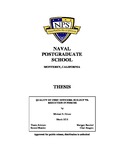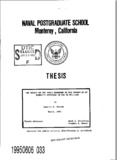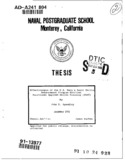Quality of USMC officers: buildup vs. reduction in forces
| dc.contributor.advisor | Bacolod, Marigee | |
| dc.contributor.author | Griner, Michael S. | |
| dc.date | Mar-16 | |
| dc.date.accessioned | 2016-04-29T21:19:28Z | |
| dc.date.available | 2016-04-29T21:19:28Z | |
| dc.date.issued | 2016-03 | |
| dc.identifier.uri | https://hdl.handle.net/10945/48529 | |
| dc.description.abstract | At the epicenter of maintaining the finest, most professional, and most feared military in the world is the quality of its leaders. The United States Marine Corps’ Officer Corps is the standard bearer, with an accession pipeline more rigorous than any in the Department of Defense. As is the historical norm, however, the U.S. military undertakes ambitious increases to end strength in the wake of a prolonged conflict. As a conflict fades, the increased end strength is no longer warranted. The typical approach during the drawdown is to reduce accessions, create stricter retention policies, and entice members to leave the service through voluntary measures. This research identifies the trade-off between quantity and quality necessitated by end-strength changes. Quantitative analysis using a difference-in-differences research design shows, relative to the buildup, officer quality increases during the drawdown. In particular, combat and non-combat occupations have a 0.0321 and 0.0834 point increase, respectively, in FITREP scores in the drawdown compared to the control group. Alternative measures and additional robustness checks support the hypothesis that the drawdown yields higher-quality officers. It is imperative to adapt force-shaping policies to a gradual approach to ensure the Marines retained during the buildup meet the quality standards of the drawdown. | en_US |
| dc.description.uri | http://archive.org/details/qualityofusmcoff1094548529 | |
| dc.publisher | Monterey, California: Naval Postgraduate School | en_US |
| dc.rights | This publication is a work of the U.S. Government as defined in Title 17, United States Code, Section 101. Copyright protection is not available for this work in the United States. | en_US |
| dc.title | Quality of USMC officers: buildup vs. reduction in forces | en_US |
| dc.type | Thesis | en_US |
| dc.contributor.secondreader | Seagren, Chad | |
| dc.contributor.department | Graduate School of Business and Public Policy (GSBPP) | |
| dc.contributor.department | Graduate School of Business and Public Policy (GSBPP) | en_US |
| dc.subject.author | United States Marine Corps | en_US |
| dc.subject.author | fitness report | en_US |
| dc.subject.author | end strength | en_US |
| dc.subject.author | buildup | en_US |
| dc.subject.author | reduction in forces | en_US |
| dc.subject.author | performance evaluation system | en_US |
| dc.description.recognition | Outstanding Thesis | en_US |
| dc.description.service | Captain, United States Marine Corps | en_US |
| etd.thesisdegree.name | Master of Science in Management | en_US |
| etd.thesisdegree.level | Masters | en_US |
| etd.thesisdegree.discipline | Management | en_US |
| etd.thesisdegree.grantor | Naval Postgraduate School | en_US |
| dc.description.distributionstatement | Approved for public release; distribution is unlimited. |
Files in this item
This item appears in the following Collection(s)
-
1. Thesis and Dissertation Collection, all items
Publicly releasable NPS Theses, Dissertations, MBA Professional Reports, Joint Applied Projects, Systems Engineering Project Reports and other NPS degree-earning written works. -
2. NPS Outstanding Theses and Dissertations





